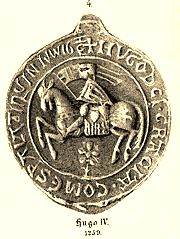Hugo IV (Tübingen)
Hugo IV. († 1267 ) was Count Palatine of Tübingen and Vogt of Blaubeuren from 1248 to 1267 .
family
He was the eldest son of Count Palatine Rudolf II of Tübingen and his wife from the von Ronsberg family , a daughter of Margrave Heinrich.
His first marriage was to a wife from the von Dillingen family , daughter of Count Hartmann IV. In his second marriage he married Beatrix von Eberstein , daughter of Count Otto, who was married in her second marriage to Konrad II. Count von Flügelau († 1301).
Hugo IV became the progenitor of the Counts of Horb and Herrenberg. According to documents, Hugo IV probably had four sons, Rudolf, Hugo, Otto and Ludwig, as well as a daughter Luitgard, who was married to Count Burkhardt von Hohenberg .
Children from 1st marriage
- Rudolf III. Count Palatine of Tübingen, Canonicus zu Sindelfingen († September 7, 1272)
Children from 2nd marriage
- Hugo IV. Count of Tübingen
- Otto Graf von Tübingen († July 9, 1289)
- Ludwig Count of Tübingen
- Kunigunde, nun in Kirchberg
- Luitgard († November 13, 1309) ∞ Burchard IV. Count of Hohenberg († July 24, 1318)
Live and act
Hugo IV as the older of the sons of Rudolf II carried the title of Count Palatine. He already appears as a Count Palatine during his father's lifetime, who, as a son undoubtedly in full manhood, gave him the umbrella bailiff of the Blaubeuren monastery , perhaps also his own seat in Horb . Hugo, although the Count Palatine, most likely had his seat in Horb later on, which he made a town. He and his sons seem to have had a particular fondness for this place. The two brothers kept Tübingen together.
Hugo IV does not play a major role in the history of his house; it also appears comparatively little, and most of the time, in matters of monasteries which were in his county or had properties in the area.
Little is known of the participation of Count Palatine Hugos IV in the political events of his time. As can be seen from a document from Pope Innocent IV, he and his father had left the Hohenstaufen cause to take the side of the aforementioned Pope. Around the year 1250 (the year of death of Emperor Friedrich II.), Most of the Swabian greats had fallen away from the Hohenstaufen house, while the Swabian cities of Ulm, Esslingen and Reutlingen kept their loyalty. There was even a fight between King Konrad and the Swabian greats and the former was defeated. Count Palatine Hugo IV was also among those who fell first; however, he does not seem to have played an outstanding role, nor to have made use of these time relationships. Under different circumstances he could have placed the House of Tubingen and himself at the head of Swabia.
However, it had donated and richly endowed three monasteries and had made many individual donations either itself or had it made from fiefs by its servants, and it had weakened itself through divisions. In the meantime, however, much had been lost through the foundation of Marchthal and Bebenhausen, through the Montfort branch, through inheritance departments of the sons and grandsons of Rudolf I, each of which weakened the property through donations. Meanwhile, a resolute man, which Hugo IV does not seem to have been, would still have had an important power at his disposal, based on which he could have an important say in the determination of the questions of the time.
Individual evidence
- ↑ a b c d e Ludwig Schmid: History of the Count Palatine of Tübingen. Tübingen 1853, pages 163–175 ( digitized version ).
| personal data | |
|---|---|
| SURNAME | Hugo IV |
| BRIEF DESCRIPTION | Count Palatine of Tübingen and Vogt of Blaubeuren |
| DATE OF BIRTH | 12th century or 13th century |
| DATE OF DEATH | 1267 |
